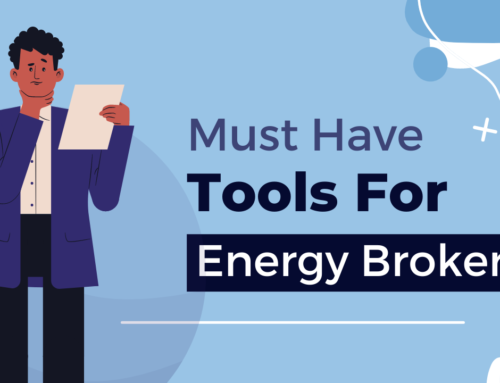Energy brokers play a critical role in the retail energy markets in deregulated energy states. They act as intermediaries between end users and retail energy suppliers, helping to negotiate the purchase of electricity and natural gas on behalf of their customers. Commercial energy customers with large energy loads face many challenges when deciphering energy suppliers, various energy plans, and different rate structures that are best suited for their business. Hiring an energy broker can help alleviate some of these risks by having an expert to guide customers through the maze of energy deregulation. This article explores the benefits of hiring a broker to help you negotiate your energy prices and the alternatives for customers in the U.S. energy markets.
Who Needs An Energy Broker?
While most residential customers can simply sign up for standard rate offers online, shopping for commercial energy plans is much more complex. Let’s explore the various commercial and industrial customer segments and how each can benefit from the services of an energy brokerage firm.
Small Businesses
Most small business owners in deregulated markets are interested in saving money and purchasing energy for less than the local utility’s price to compare. While there is an opportunity to do so, there are serious risks associated with choosing an energy supplier. For example, without the help of an expert, a small business could be subject to energy scams and fraud. Some common negative practices include unauthorized switches, hidden energy pass-through costs, and auto-renewal contracts that lock customers into high rates with large early termination fees.
Since most small businesses do not have the resources to employ energy managers, it is often recommended that they utilize the services of an energy broker when negotiating with energy suppliers. The broker has the knowledge of the market and its participants to be able to structure the best energy contract for the business’s specific needs.
An energy broker can also act as a long-term resource for small businesses by answering questions about energy, managing energy contract renewals, and helping the customer decipher their energy bill.
Large Commercial and Industrial Organizations
High energy users, such as large commercial organizations or industrial facilities, require sophisticated energy procurement strategies. Since these organizations have complex energy usage patterns, purchasing standard fixed-rate energy contracts is not always advantageous. An energy broker can help structure hybrid energy solutions, such as block and index products and load following products, that are designed to maximize savings while minimizing market risk.
Larger retail energy companies employ experienced sales professionals who can also guide these customers through these complex options. The advantage of working with a licensed energy broker, however, is their access to multiple supplier offers. The broker can pin suppliers against one another in order to negotiate the best price for their customers.
Renewable Energy Participants
For those businesses looking to participate in renewable energy solutions, such as energy storage or solar, an energy broker with the right knowledge can help to facilitate these transactions. Brokerage companies like Diversegy, offer an array of renewable energy solutions outside of standard natural gas and electricity procurement. Having a broker in your corner is a major advantage when trying to understand complex power purchase agreements (PPAs) with solar providers or negotiating contract terms with energy efficiency companies. Implementing these strategies can help businesses to reduce carbon emissions and develop decarbonization strategies that align with their corporate goals.
Who Might Not Need A Broker?
Small businesses with minimal energy usage may not benefit from choosing an alternative energy provider. Sometimes, the process of choosing a supplier and managing an energy contract is not worth the potential savings due to limited usage. These companies can keep it simple by remaining with the local utility company or the provider of last resort.
Furthermore, large organizations with in-house energy managers or procurement professionals can often pay more by working with an energy broker. These employees should be performing the same functions as a sophisticated broker by negotiating with multiple providers, structuring supply agreements based on usage patterns, and watching the spot and energy futures markets to time purchases when prices are low.
The Types of Energy Brokers
All energy brokers are not created equal. While most brokers share the commonality of negotiating the supply of energy on behalf of their customers, they all perform various services and offer different solutions. Let’s explore some of the different types of energy brokers and how they might benefit your organization.
Power & Gas Brokers
Traditional electricity and natural gas brokers are licensed in the states where they operate, are contracted with multiple retail energy providers, and help their customers negotiate energy contracts with suppliers. These brokers are experts in the commodity markets, follow energy price trends, and are responsible for helping their customers save money by paying less for the energy they use.
Renewable Energy Brokers
Renewable energy brokers, on the other hand, are not always licensed organizations. These energy brokers help customers evaluate solar energy providers and negotiate power purchase agreements. Some traditional energy brokers also act as renewable energy consultants by helping their customers procure renewable energy certificates (RECs) in order to meet green energy standards. While purchasing RECs is not a direct way to participate in renewable energy supply, large organizations often use this strategy to offset carbon emissions and become carbon neutral.
Utility Bill Audit Specialists
While sometimes also acting as licensed energy brokerage organizations, utility auditors and utility bill auditing companies work in a different segment of the energy industry. These companies evaluate utility tariffs and billing records to identify errors and misclassifications that can lead to savings. Most of these companies operate on a contingency-fee basis by invoicing their customers for a percentage of the total savings they are able to generate as a result of the utility audit. These companies that are also involved in the brokering of electricity and natural gas usually exempt any supply savings from their contingency fees since they earn sales commissions for brokering energy contracts.
What To Expect From Your Energy Broker
A competent energy broker or consultant will provide the following services:
- Energy price negotiation.
- Tailored energy procurement strategies.
- Cost-saving analysis and utility bill audits.
- Renewable energy integration guidance.
- Energy market monitoring.
- Energy contract renewal management.
The Benefits Of Hiring A Professional Energy Broker
Energy broker fees can come in different shapes and forms, such as flat fees, sales commissions from suppliers, or embedded rates in contracts. While some customers view energy brokers as middlemen driving up costs, there are many benefits offered by brokers that can negate those concerns. Let’s explore the top benefits of hiring an energy broker.
Cost Savings
The number one benefit of working with a broker is energy cost savings. Brokers specialize in finding the lowest energy prices for their customers so they can save on energy costs. While energy salespeople often represent a single supplier, brokers can get prices from up to 60 energy suppliers, guaranteeing the lowest rates at any given time.
Time Efficiency
It can be difficult to manage your energy procurement strategy, often requiring many hours per year. Hiring a broker will cut down on this time and remove these time-wasting tasks from your plate. Since brokers have existing supplier relationships and are used to negotiating energy contracts on a daily basis, they can efficiently manage your energy procurement process with little time required from the customer.
Market Expertise
Energy professionals have a deep understanding of the energy markets, price drivers, and the various data points that affect the overall direction of the market. Having an expert like this in your corner can help you to make better decisions based on data that will ultimately lead to cost savings.
Risk Management
Finally, energy brokerage companies thrive at managing risk for their customers. Energy index markets can be quite volatile as prices change instantaneously based on real-time supply and demand. And, energy futures markets are driven by trending volumes and market outlook. Managing the price risk of the market can be challenging when you have your business to run. A professional energy broker can help you create energy deals that help mitigate your market exposure and reduce risk.
Energy Broker Alternatives
Should you decide to not hire a broker, there are a few alternatives.
- Do It Yourself: While you might save money on broker fees or commissions, managing your own energy procurement strategy can be challenging if you do not understand the complex retail and wholesale electricity markets. This plan requires significant time and expertise on behalf of the business owner and can often cost more money than hiring an energy firm.
- In-House Energy Manager: While this is a perfectly suitable strategy for large organizations, in-house managers do not always have access to the same resources as licensed energy brokers. In-house employees will be forced to work with salespeople working for retail energy providers since they do not hold licenses to broker energy. These sales personnel earn commissions that can be higher than typical energy broker fees. Furthermore, in-house employees might not have access to the same tools and energy market data that energy brokers use to service their customers.
What To Expect When Hiring A Broker
So, you’ve decided to hire an energy broker. What’s next? Here is exactly what you should expect from a professional energy brokerage firm.
- Usage Review: You will first need to authorize your broker to download your historical energy usage and billing data from the local utility provider. During this step, the broker will evaluate your consumption patterns to determine the best-fit energy supply products.
- Contract Analysis: Next, the broker will analyze your existing energy supply contracts to look for vulnerabilities and inconsistencies. This will help to identify weaknesses in your current structure, develop a better energy strategy, and set goals for the future.
- Supplier Negotiations: Next, the broker will contact multiple suppliers on your behalf to obtain price quotes and negotiate contract terms. Most brokers will prepare a report for you to review that outlines the different pros and cons of each supplier offer.
- Ongoing Monitoring: After you have entered into an agreement with a supplier, the broker will continue to monitor your accounts and market prices to continually look for new pricing opportunities. Because energy trades in a forward market, brokers can help you lock in favorable prices even before your existing contract expires.
Learn More About Diversegy’s Energy Broker Services
Diversegy is a nationally licensed energy brokerage firm part of a publicly traded energy conglomerate. We have helped thousands of businesses across the country negotiate favorable energy supply contracts and have generated millions of dollars in cost savings. Contact our team of energy experts today to learn more about our expert solutions and to get a complimentary analysis of your energy spend.



